Ever wondered why that sparkling, brand-new RV you just bought seems to quickly lose its luster after the first few months of ownership? Why is it that some seemingly fantastic deals turn sour faster than a lemon on a hot summer day?
Rolling along the highway, the sense of freedom that comes with a Recreational Vehicle (RV) is like no other. You’ve got a mobile castle with all the creature comforts of home, yet with every sunrise, a new backyard awaits.
It’s an exhilarating lifestyle many of us dream about, but before you take that leap and hand over your hard-earned cash to your local RV dealer, hold up. We’re about to peel back the shiny veneer of the RV sales world.
In this article, we will reveal the most common schemes that could turn your big purchase into a big headache. From inflated prices and hidden fees to misleading warranties and preying on your lack of knowledge – we’re pulling back the curtain on it all.
It’s time to navigate the twists and turns of RV dealerships with open eyes.
Common Misconceptions About Buying RVs
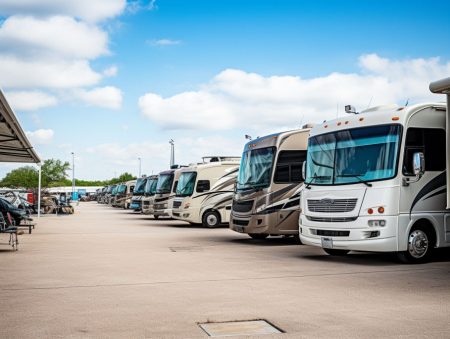
There’s a lot of hearsay about scoring the best deal on an RV. You might hear of a huge “discount” being offered or the promise of exclusive “upgrades and extras” at no extra cost.
Beware, as these are often tactics to make the price seem more appealing than it really is.
Here’s an example:
One surprisingly common misconception involves the allure of “free” upgrades and extras. This is often used as a sales tactic where dealers promise exclusive, premium features at no additional cost, making the deal seem more attractive. However, in reality, the cost of these upgrades is frequently built into the inflated price of the RV.
Let’s say you’re comparing two similar RVs. RV1 is priced at $50,000, while RV2 is priced at $60,000 but comes with “free” upgrades like a state-of-the-art entertainment system, a solar power setup, and an extended warranty.
On the surface, it seems like RV2 is offering more value with its extra features. However, if you dig deeper, you might find that purchasing RV1 and adding similar upgrades independently could cost you significantly less than $60,000.
You might be able to install a similar entertainment system for $3,000, a solar power setup for $2,000, and get an extended warranty for $2,000. This means the total cost for RV1 with similar upgrades would be $57,000, still $3,000 less than RV2.
So, while the promise of “free upgrades” might seem like a fantastic deal, it could just be a tactic to inflate the price. The key is to do your own research and understand the actual cost of these upgrades before falling for the “free” extras trap.
Tactics RV Dealers Use to Inflate Prices
We’ve all seen the flashy sales tags, but it’s crucial to be aware that the listed price might not be as straightforward as it seems. Dealers often inflate the RV’s base value to make their discounts appear more significant. Be aware also of misleading financing options and additional costs that are often hidden, such as delivery and dealer preparation fees.
Let’s unravel the mystery behind the so-called “Zero Percent Financing” offer, which many find incredibly enticing. The idea of not having to pay any interest on your RV loan seems like a dream come true. But is it really as great as it sounds?
Consider this scenario:
You’re at a dealership, looking at an RV listed for $100,000. The dealer then presents you with two financing options. Option 1 is a “Zero Percent Financing” deal for the full listed price of $100,000. Option 2 is a traditional loan with an interest rate of 4%, but the RV’s price is reduced to $90,000 as part of a special sale.
Initially, Option 1 might seem like the better deal because of the zero-interest lure. However, if you calculate the total payment over the life of a 5-year loan, the story unfolds differently.
Option 1, the zero-percent financing, would have you pay $100,000 over the course of 5 years (assuming it’s evenly distributed over 60 months). Option 2, despite having a 4% interest rate, would have you pay roughly $99,300 over the course of 5 years considering the interest, which is still less than Option 1.
In this example, the zero-percent financing offer was simply a tactic to justify not offering a discount on the RV’s price.
So remember, when faced with a “Zero Percent Financing” offer, it’s essential to crunch the numbers and consider all available options. This surprising strategy is one-way dealers might try to make a deal appear better than it truly is.
The Sales Pitch: Unveiling the Pressure Tactics
Stepping into an RV dealership can feel a bit overwhelming. Salespeople may use pressure tactics to get you to make a quick decision. They might create a sense of urgency with a limited-time offer, play on your fear of missing out, or manipulate your emotions. Remember, it’s okay to step back and take your time.
Here’s a surprising scenario that often plays out in RV dealerships: The “One-Time-Only Event” pressure tactic.
Let’s say you’ve been eyeing a particular RV model, and upon visiting the dealership, you’re told it’s the last one left. Not only that, but it’s also part of a “one-day-only” sale. The salesperson adds to the drama by mentioning other potential buyers who’ve shown interest in the same RV.
You start to feel a rush of adrenaline. You hadn’t planned on buying right away, but this seems like a once-in-a-lifetime opportunity. The fear of missing out kicks in, and against your better judgment, you’re ready to sign the paperwork.
Here’s the surprising part: After making a hurried decision, you later find out that the same model is widely available at other dealerships, even at a lower price! The “one-time-only” event was a pressure tactic used to rush you into making a quick and possibly unwise purchase.
The key takeaway is that it’s perfectly okay to take a step back when faced with these high-pressure sales tactics. Remember, major purchases like an RV should never be rushed. It’s essential to take your time, do your research, and make an informed decision.
How to Spot and Avoid Shady Warranty Deals

Warranties can be a lifesaver, but they can also be a source of confusion and unexpected costs. Be sure to read the fine print and understand what is and isn’t covered. Be skeptical of long-term warranties and expensive service contracts that may not be necessary or cost-effective.
Here’s an eye-opening example concerning long-term warranties.
Let’s assume you’re about to finalize your RV purchase. The salesperson then pitches a long-term warranty covering the next seven years, costing an additional $5,000. They convince you by saying this will protect you from potentially expensive repairs down the road. At first glance, it sounds like a safety net you shouldn’t pass up.
However, when you actually examine the fine print of the warranty agreement, you realize it doesn’t cover “wear and tear,” which, incidentally, is the leading cause of most RV repairs. Additionally, many of the big-ticket items, such as the drivetrain and roof, are only covered under a manufacturer’s warranty that comes standard with most new RVs and does not extend to seven years.
Even more surprisingly, the warranty demands that all maintenance and repairs be carried out at authorized centers only. What if you’re on the open road, miles away from such a center, and your RV breaks down? The warranty might not provide any help in that situation.
In essence, you may have paid $5,000 for a warranty that does not cover most of the potential issues you’ll face. In contrast, setting aside that money for future repairs or regular maintenance could have been more cost-effective.
Therefore, while warranties can offer peace of mind, it’s crucial to understand what they do and don’t cover. Don’t be swayed by the promise of long-term protection without fully understanding the costs and conditions.
The Trade-in Trap: How Dealers Profit from Your Old RV
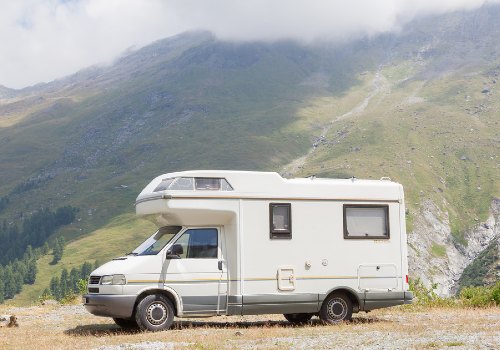
Trading in your old RV can seem like an easy way to reduce the cost of your new one, but it can be a double-edged sword. Dealers often undervalue trade-ins, thereby making more profit at your expense. Be sure to know the fair market value of your old RV before starting negotiations.
Picture this surprising situation:
You’re looking to upgrade your current RV, which you’ve maintained in excellent condition. Based on your research, you estimate its fair market value to be around $30,000. You approach a dealer who has the upgraded model you’re interested in, priced at $80,000. The dealer assesses your old RV and offers you a $20,000 trade-in value against the new one. At first, this seems like a decent offer since it reduces the price of your new RV to $60,000.
However, the catch is revealed a few weeks later when you casually check the dealer’s website. You’re shocked to see your old RV listed for sale at $35,000! The dealer had undervalued your trade-in by $15,000, sold it for even more, and made a hefty profit.
Want to Connect With a Community of Over 1,078 RV Enthusiasts?
This surprising scenario highlights the importance of knowing the fair market value of your RV before starting negotiations and considering other avenues to sell your old RV. By selling it independently, you could have gotten its true value, reducing the cost of the new RV even further. Remember, a trade-in can be convenient, but convenience sometimes comes at a cost.
Steps to Safeguard Yourself When Buying an RV
Knowledge is power! Do your research on different models, dealers, and prices before stepping foot into a dealership. Don’t be rushed into a decision, and consider an independent inspection of the RV to identify potential issues the dealer may not disclose.
Imagine this scenario:
You’ve fallen in love with a particular RV model that a dealership has priced at $75,000. It’s slightly over your budget, but it’s the dream RV you’ve always wanted. The salesperson emphasizes its pristine condition, low mileage, and exceptional features. Caught in the excitement and emotion of finally owning your dream RV, you’re on the verge of making an on-the-spot decision.
However, you decide to pause and follow the advice of having an independent inspection. You hire a professional RV inspector who discovers a substantial structural issue that would cost around $10,000 to repair. This was a hidden problem that the dealer had not disclosed and that you would have overlooked.
Surprised and relieved, you negotiate with the dealer using this new information. The dealer agrees to handle the repairs at no extra cost to you or, alternatively, reduce the price of the RV to reflect the cost of the repair. In the end, your dream RV now fits within your budget.
This example highlights the significance of doing comprehensive research and the value of an independent inspection.
Key Takeaways to Avoid Being Scammed
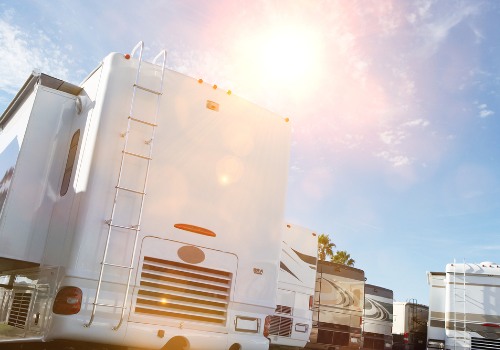
- Make it clear that you are shopping around and not making an immediate purchase.
- Be cautious to avoid the turnover scam where you are passed from one salesman to another with the aim of wearing you down.
- Negotiate by the selling price of the RV, not by monthly payments. Ask for a breakdown of all fees.
- Assess various options and services available for RVs, considering those that best suit your needs.
- Resist making an immediate decision and shop around instead.
- Be prepared and confident; remember you are in control of the conversation when buying an RV.
- Research the market value of the RV you’re interested in and negotiate accordingly. This can be done through the NADA Consumer Recreational Vehicle Appraisal Guide.
- Never rely on a mail-in rebate when paying for an RV. Make sure any rebates are directly applied to your purchase price.
- Avoid giving away personal identification such as your driver’s license or SSN unless you’re in the advanced stages of a transaction.
- Be aware of various sales pitches and tactics employed to encourage immediate purchase. Understand these but avoid succumbing to pressure.
- Try to deduct for excess mileage and condition based on guidance from the NADA Consumer Recreational Vehicle guide when buying a used vehicle.
- Always ask for maintenance records of used RVs you’re interested in to confirm vehicle condition.
- Consider having a professional inspection by an RV mechanic for used vehicles.
- When selling, try to sell privately to maximize return, as trade-ins typically undervalue your RV.
- Request your dealer not to run a credit check without your explicit permission when you provide a copy of your license for a test drive.
- Use a service like AutoCheck Report; this can save you from safety issues and financial losses on used vehicles.
- Understand that RVs, like most vehicles, depreciate mostly within the first year, challenging any claim that it would be a good investment.
- Avoid any immediate decision and shop around while knowing what exactly you are paying for and understanding the interest in writing.
- Make sure all fees are negotiated before they go on an invoice; reject extra fees such as advertising fees, dealer prep, etc.
Conclusion
Buying an RV should be a thrilling adventure, not a journey into the unknown. Being informed about these common tactics can protect you from falling into a pricey trap and ensure your RV buying experience is as enjoyable as the travels that lie ahead.
How Not to Get Scammed at Dealerships (Video)
Related Questions
1. What’s the most common tactic RV dealers use to inflate prices?
One common tactic is to inflate the RV’s base price, making discounts appear more significant than they really are. Dealers may also add hidden costs such as delivery fees, dealer preparation fees, and extended warranties.
2. How can you avoid being pressured into making a quick decision at an RV dealership?
Always remember you’re in control of the purchasing decision. If you feel rushed or pressured, it’s perfectly okay to take a break, step away, and give yourself time to think.
3. Are long-term warranties always a good investment for my RV?
Not always. While warranties can offer peace of mind, they can also come with exclusions and requirements that may limit their usefulness. Always read the fine print and consider the cost of the warranty against potential repair expenses.
4. What should you know about trading in your old RV at a dealership?
Dealerships often undervalue trade-ins to increase their profit. It’s crucial to know the fair market value of your RV before starting trade-in negotiations.
5. Is there any benefit to getting an independent inspection of an RV you want to buy from a dealer?
Yes! An independent inspection can reveal potential issues the dealer may not disclose, which can help you negotiate a better price or avoid a costly mistake.
"Man cannot discover new oceans unless he has the courage to lose sight of the shore."
-- Andre Gide

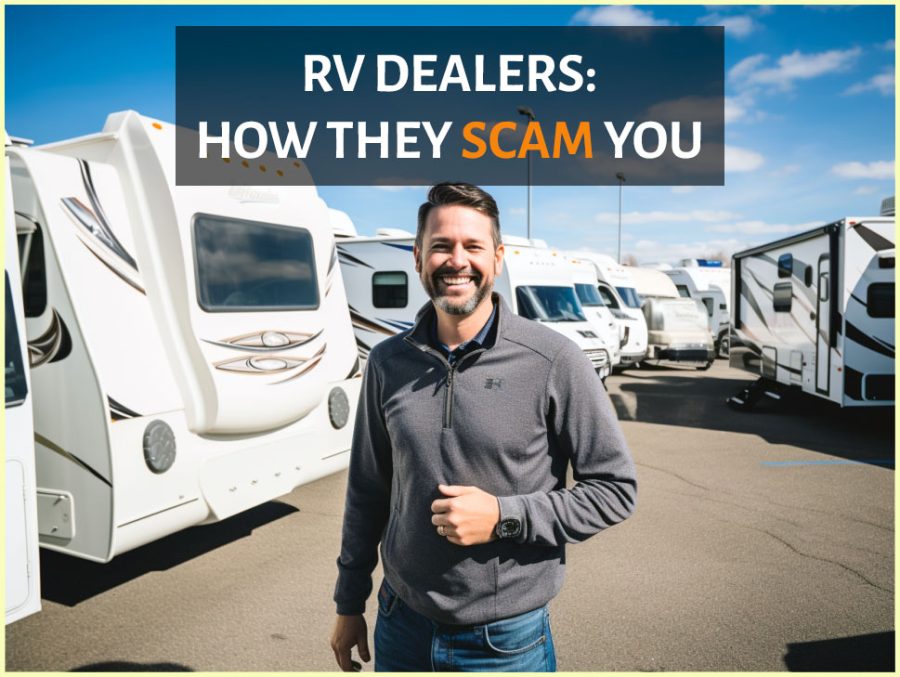

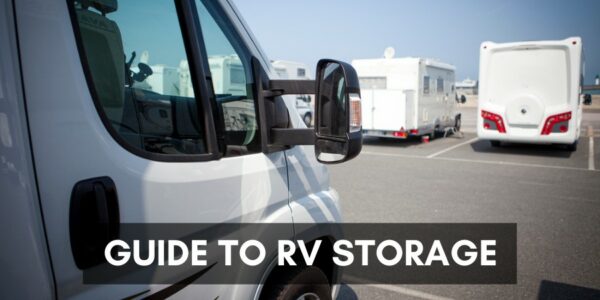


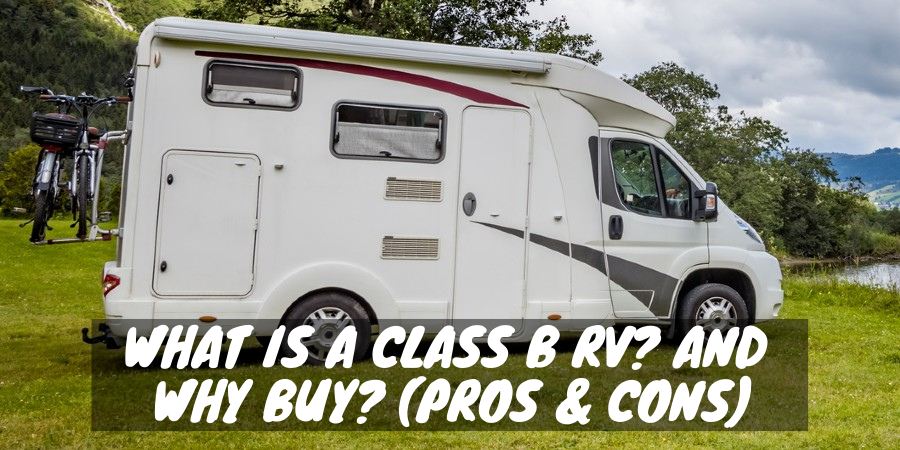


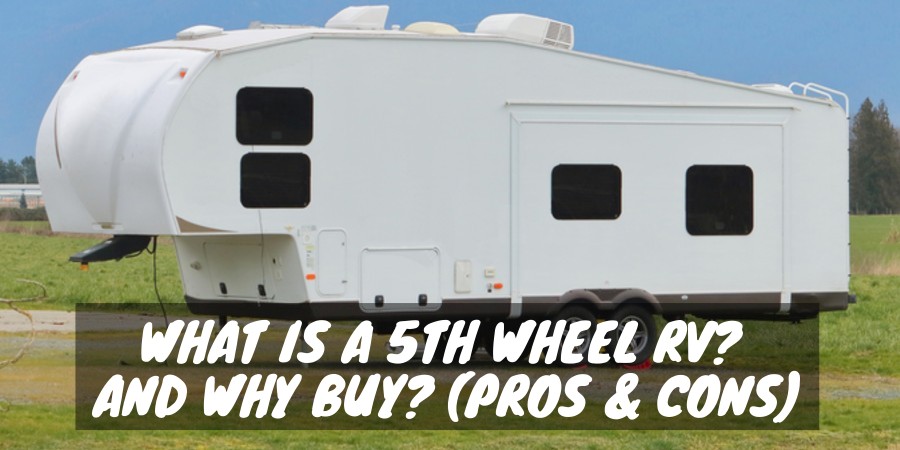
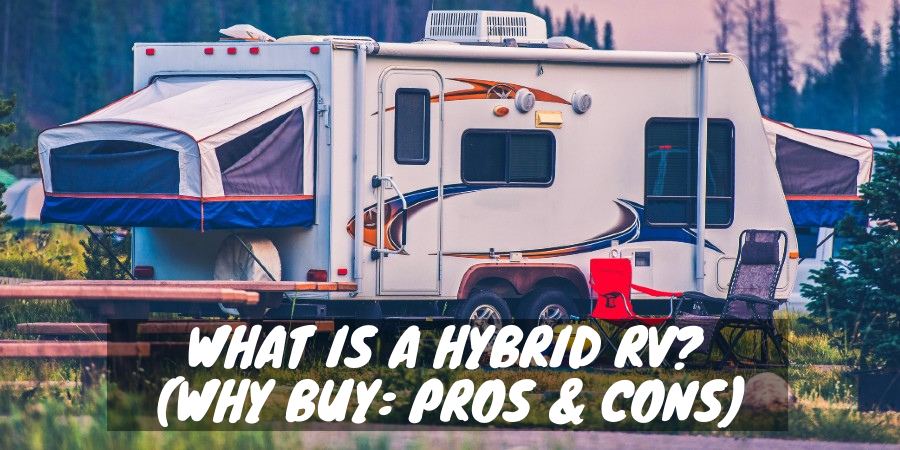
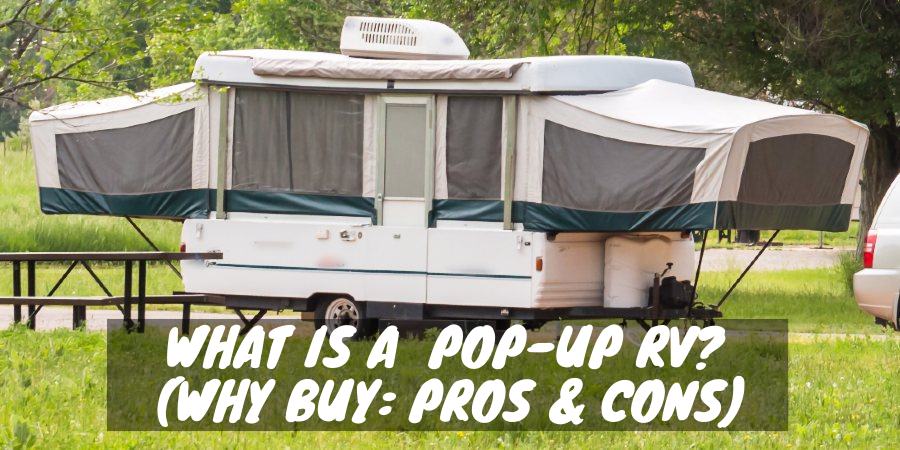
Thanks for this information. We almost got scammed, wish I had seen this sooner but good for other RV purchasers. We backed out just in time but had to contact the BBB to get our deposit back. Buyers Beware!
I wish I had heard this before I bought my RV. Everything you said happened to me. When I first arrived, I found what I liked. When I asked For a print out of the feature Et cetera. They said they would email it, Which they eventually did six hours later After they closed; When I discovered it was not the one I was looking at. They had me come in several days later, At 9am. The finance department and everyone else would not answer my questions And had me sitting in the coffee Room forever.
I Have only myself to blame. I realized come six p m that I was being scammed. I was so tired, I could hardly walk or even hold my head up. They had me sign papers, That were not filled out, And I asked to take time to read them before I signed, They said they weren’t finished filling them out yet, Nine hours later.
I have never been so depressed in making a purchase in my life! I wanted to cancel the deal, When they asked for more money down, (I originally Was going to put $20,000. Down.) But they only wanted twelve thousand. That was told it was too late To change my mind. I was glad just to get out of there.